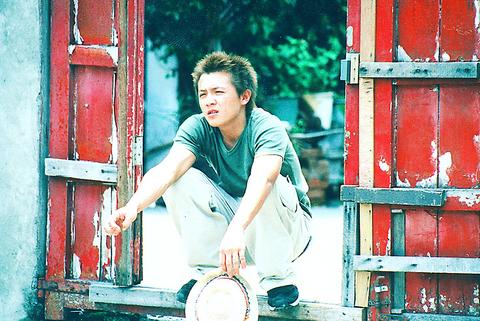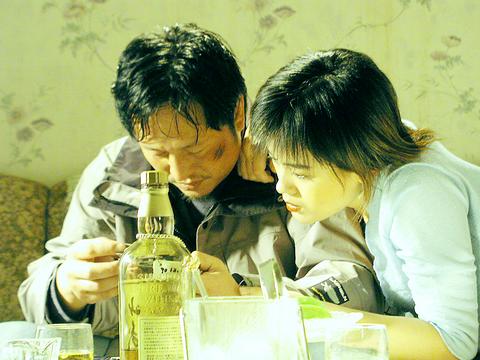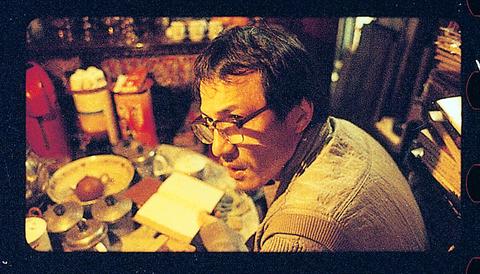Chinese is becoming the lingua franca of Lido Island in Venice, Italy. No less than five Chinese-language films are screening at the 59th Mostra Internazionale de Arte Cinematografica, or Venice Film Festival, which will take place from Aug. 29 to Sept. 8. Two of the five are from Taiwanese filmmakers.
The Best of Times (美麗時光), by Taiwan's own Chang Tso-chi (張作驥), is the only Chinese-language film selected to compete for the festival's highest prize, the Golden Lion. Hong Kong filmmaker and frequent guest at Venice, Fruit Chan (陳果), who last year brought his Hong Kong Hollywood, and Durian Durian (榴槤飄飄) the year before, this year brings his digital film Public Toilet to screen in the festival's Against the Mainstream section. In that same section are Chinese filmmaker Tian Zhuangzhuang's (田壯壯) 1930s drama Springtime in a Small Town (小城之春), and Missing Gun (尋槍) by China's Lu Chuan (陸川).
Cheng Wen-tang (

The festival's new artistic director, Moritz de Hadeln, announced the line-up of participating films last week. The opening film will be Julie Taymor's Frida, about the life of Mexican artist Frida Kahlo, played by Salma Hayek, whose life was closely intertwined with Central American history. Also in the competition are Steven Soderbergh's latest feature, Full Frontal, Liliana Cavani's Ripley's Game and Japanese director Takeshi Kitano's Doll.
Adding to the festival's Chinese attributes, festival organizers earlier announced that Chinese actress Gong Li (鞏俐) will serve as the jury chairperson, after leading the judges in Berlin in 2000 and at Cannes in 1997.
Filmmakers from Taiwan, Hong Kong and China are no strangers to the Golden Lion. In 1989, Hou Hsiao-hsien's (侯孝賢) City of Sadness (悲情城市), an epic about the 228 incident, was the first Taiwanese film to win the award. Then in 1994, Tsai Ming-liang (蔡明亮) walked away with the Golden Lion for his second feature, Vive L'Amour (愛情萬歲). Chinese director Zhang Yi-mou (張藝謀) took the award in 1999 for Not One Less (一個都不能少).

Chinese film fever seemed to take a rest last year, winning fewer awards and garnering smaller attention at major film festivals. But Chang's The Best of Times is now taking the lead to create further international hype for Chinese-language films.
Chang, winner of the 2000 Tokyo Film Festival for his Darkness and Light (黑暗之光), is known for his stories of people living at the fringe of the society. Ah-Chung tells the story of disaffected youth living in a shantytown outside Taipei and Darkness centers around blind characters. The Best of Times has been praised by critics in Taiwan as Chang's best work. The story revolves around two teenage boys from troubled families who frequent a fetid sewer near their homes.
Films about people at the fringe of society sounds like a familiar topic for many Taiwanese films, following Hou's style of social realism. But in Chang's films there is always another layer under the truthfulness; a strong romanticism, almost surreal in the humble lives of his characters. Exciting gang-fights are juxtaposed against the sentimental lights and shadows of the corner of a rainy day, sunsets by the sewer and the beautiful coral reefs where the two boys swim. And by the bed of a girl suffering from Leukemia there appears a unicorn. "Magical realism" could be used to describe the power behind the story. The Best of Times is Chang's third feature and his best chance yet competing against the likes of Kitano and Soderbergh.

Another Taiwanese entry, Cheng Wen-tang's Somewhere Over the Dreamland is a story about two Aboriginal men having different adventures in urban Taipei. One has mysterious dreams about his lost wallet and rice field. The other, a worker at a Japanese restaurant, always kills time at phone sex games, meets with a bizarre girl who tells him about a dream involving a rice field.
Cheng began movie-making in 1996. The film is his second feature film.


Towering high above Taiwan’s capital city at 508 meters, Taipei 101 dominates the skyline. The earthquake-proof skyscraper of steel and glass has captured the imagination of professional rock climber Alex Honnold for more than a decade. Tomorrow morning, he will climb it in his signature free solo style — without ropes or protective equipment. And Netflix will broadcast it — live. The event’s announcement has drawn both excitement and trepidation, as well as some concerns over the ethical implications of attempting such a high-risk endeavor on live broadcast. Many have questioned Honnold’s desire to continues his free-solo climbs now that he’s a

As Taiwan’s second most populous city, Taichung looms large in the electoral map. Taiwanese political commentators describe it — along with neighboring Changhua County — as Taiwan’s “swing states” (搖擺州), which is a curious direct borrowing from American election terminology. In the early post-Martial Law era, Taichung was referred to as a “desert of democracy” because while the Democratic Progressive Party (DPP) was winning elections in the north and south, Taichung remained staunchly loyal to the Chinese Nationalist Party (KMT). That changed over time, but in both Changhua and Taichung, the DPP still suffers from a “one-term curse,” with the

Jan. 26 to Feb. 1 Nearly 90 years after it was last recorded, the Basay language was taught in a classroom for the first time in September last year. Over the following three months, students learned its sounds along with the customs and folktales of the Ketagalan people, who once spoke it across northern Taiwan. Although each Ketagalan settlement had its own language, Basay functioned as a common trade language. By the late 19th century, it had largely fallen out of daily use as speakers shifted to Hoklo (commonly known as Taiwanese), surviving only in fragments remembered by the elderly. In

Lines between cop and criminal get murky in Joe Carnahan’s The Rip, a crime thriller set across one foggy Miami night, starring Matt Damon and Ben Affleck. Damon and Affleck, of course, are so closely associated with Boston — most recently they produced the 2024 heist movie The Instigators there — that a detour to South Florida puts them, a little awkwardly, in an entirely different movie landscape. This is Miami Vice territory or Elmore Leonard Land, not Southie or The Town. In The Rip, they play Miami narcotics officers who come upon a cartel stash house that Lt. Dane Dumars (Damon)